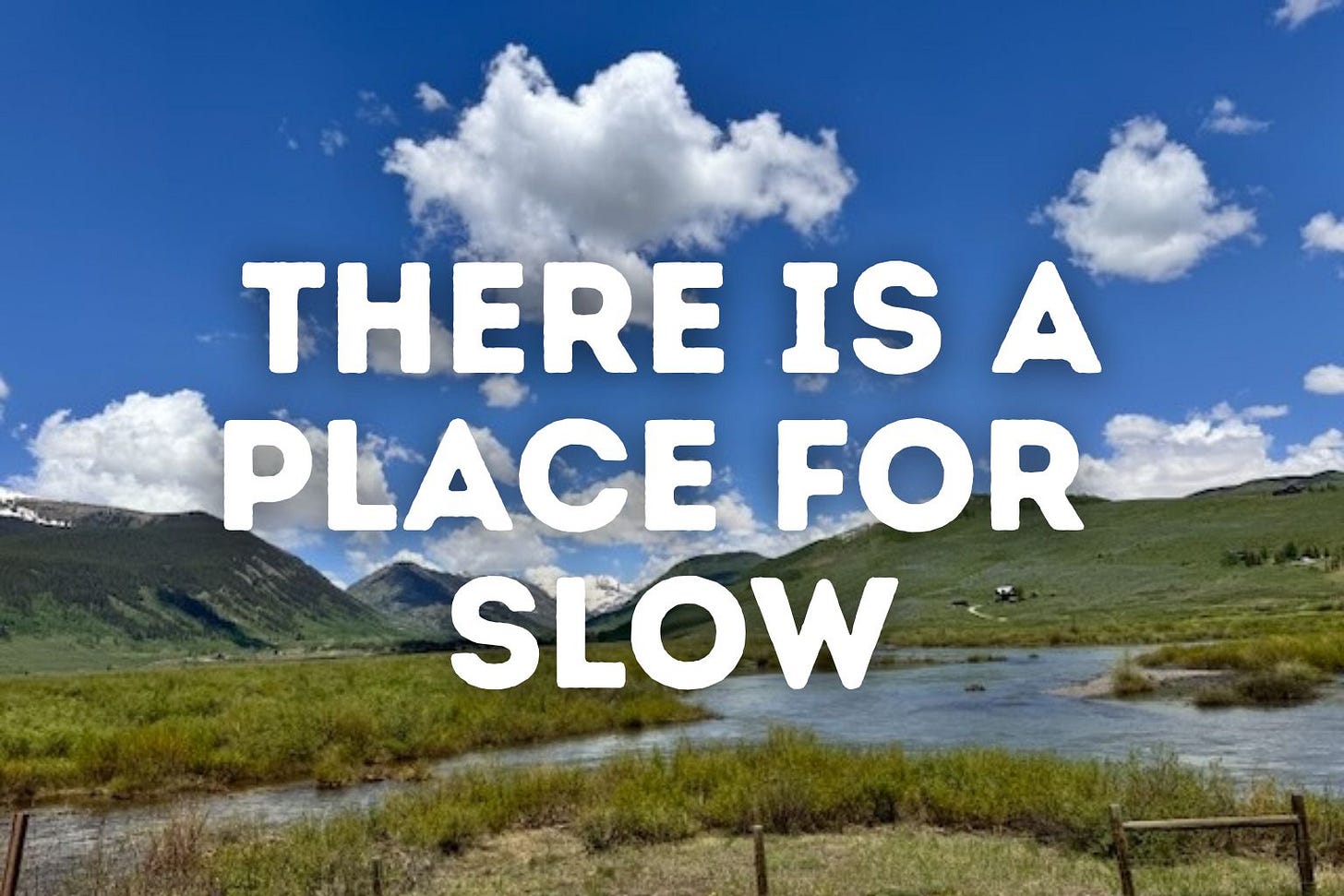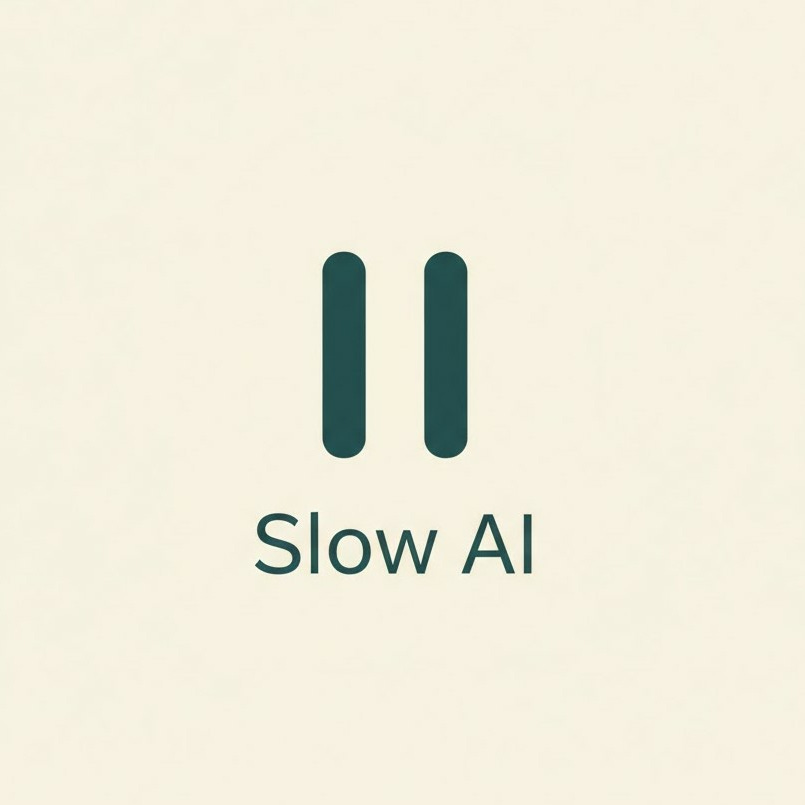They Want AI To Accelerate Your Life. Do YOU?
The worldview hiding inside the church of speed, efficiency, and optimization
Hi you.
Lately, my YouTube homepage has been bullying me. Here are some of the titles I see, literally right now, and they are representative of my starting experience on any given day.
25 Things Nano Banana Pro Does That AI Couldn’t Before
Gemini 3 Gives You Superpowers – Here’s How To Unlock Them
Welcome to Google Antigravity
Accelerating private equity deal flows with Claude (???)
I’m surprised I haven’t come across this one yet:
In The Time You’ve Spent Scrolling This Feed You Could Have Tripled Your Productivity You Pathetic Waste Of Carbon
Thankfully, my home page also includes items like this “Soulful Amapiano Mix” to balance out my nervous system. Otherwise, why do I even bother starting my day?
And it’s not just my YouTube feed.
The broader tech marketing environment is constantly telling us we should be going faster. This is more than an algorithmic content recommendation. It’s a worldview predicated on pushing us towards acceleration as our own personal and society-wide default setting. We should challenge that.
The Three A’s Framework
I started writing about AI three years ago when ChatGPT was launched at our faces. To make sense of it, and because I’m a never-fully-recovered strategy consultant, I came up with a framework for understanding the moment and deciding how we approach it in our lives, work, households, communities, and institutions.
Creatively, I call it, The Three A’s Framework: Augment, Accelerate, Accommodate.
In this newsletter, I am putting the spotlight on the first one: Accelerate.
We’ve been sold the idea that AI will accelerate everything: writing, coding, business success, creativity, productivity, human thriving. But I think we need to add a question mark behind it.
Accelerate?
That’s better. The assumption that faster is always better is not a self-evident truth. It’s a value judgment tech companies are making for us, one we’re encouraged never to question.
As for the question we should be asking, there are actually two.
Does AI actually make things faster? (I know, how dare I question the tech lords?)
Is faster even what we want? (Now I’m questioning…. capitalism?)
Today’s essay focuses on question 2: Is acceleration something we should want, and who gets to decide what should move faster?
Selling Faster As A Universal Good
Tech companies pitch AI with a clear, repeated promise of faster workflows, increased output, and more productivity. Do more in less time! It’s positioned as a combination of faith and fact, but the assumption that faster is better is has a worldview embedded inside of it:
Speed is inherently and universally valuable
Slowness is wasteful
Reflection is optional
Output and production are the point
If you aren’t accelerating, you’re falling behind and thus, losing
Life is a problem to be solved, a process to be optimized and made more efficient
That worldview requires and thrives off of an unnatural ecosystem of quarterly growth metrics, engagement dashboards, Gross Domestic Product math, and other corporate success criteria. All hail the KPIs. It does not necessarily serve human thriving. It’s a lifeless interpretation of the purpose of life itself.
Some Things Should Not Be Accelerated
I’m inviting you to see that assumption about the value of speed and challenge it. Right now. Think about your life. What parts of it work better when you slow down? What feels better at a slower pace? Where does value and meaning increase with the amount of time something takes?
Here’s a list for me:
Meals
Time with the memories of my departed mother
Walks with my wife
Sipping a very well-made cocktail
Savoring chocolate cake
Sex (yes, typing “chocolate cake” prompted me to think of sex)
Laughter
Floating in the ocean
Steadily creating something
The sense of belonging in community
Naps
So much of what I value in life can’t be quantified to begin with. Do we really want AI to optimize all our humanity into efficiency metrics? Or, is the point of being alive to have moments that take the time they take?
It’s easy to get caught up in how we can apply the promised benefits of AI to every area of our lives. I have experienced those benefits myself. But I think we need to move upstream and look at this assumption around speed then ask, very slowly…
“What do I want to speed up? What do I want to maintain? And what do I want to slow down?”
These are questions we should ask as individuals and in our various group settings. Teams inside a company should ask this about all their processes. Educational subcommittees and classrooms should ask this of themselves. Families should discuss it over a slow meal.
The Risk of a Faster-Everything Culture
If we speed through or skip those questions altogether, if we adopt the acceleration dogma uncritically, we flatten what makes us human. We lose the value of a diversity of pace, expression, and texture. And we lose the ability to move more slowly even outside our relationships with technology. When we allow technology to speed us up, we end up speeding up everything. We are less patient with a book, a movie, a child, even with ourselves. Like a contagion, speed and acceleration infect the entirety of our lives and experiences. Everything, from our emails to our food, starts to look, sound, and feel the same. It’s gentrification but for the soul.
We regress toward some blended mush of a mean, making the world smoother, more efficient, and utterly boring. We kill culture and optimize ourselves into a world without discernible creativity. We become more like machines than living beings. We make life lifeless.
But real life, especially when we consider it beyond our narrow human lens, is so much more than fast or efficient. One of the reasons the world is beautiful is because everything isn’t moving at the same speed.
A forest does not try to grow at the fastest rate possible. A cloud’s goal isn’t to set a personal best for racing across the sky. Sometimes a rabbit just sits in the sun for a few minutes. And that’s all, folks.
Acceleration Is A Cultural Inheritance
The acceleration worldview has roots established long before our recent obsession with generative artificial intelligence and the Accelerationists within that community.
Industrialization. Colonization. Extraction. Much of the history of so-called Western civilization is predicated on these modes of being in the world and the separation of our humanity from the rest of life, including the pace of life. We’ve been taught to discover and extract value from nature and from other humans as fast as possible.
We put a price tag on trees, seeing them only as commodities rather than our lungs beyond our bodies. We put a price tag on human beings and lost much of our own humanity in the process. We have drained the world of life in order to create an invented concept of financial wealth. We invented an entirely constructed concept of money just so we could keep count of this hallucinated value system.
AI is a test and an additional opportunity. It is far more than a technological moment. It’s a political and cultural one as well. Will we double down on a doctrine of domination and acceleration? (This film is a worthy watch). Or will we choose a different set of foundational principles on which we build our future?
Where To From Here?
Winter is coming, both literally and metaphorically.
Our non-human relatives in the larger family of nature slow down in winter. As part of nature ourselves, maybe we can too. AI doesn’t have a life to live. We do.
You are allowed to resist acceleration.
You are allowed to choose slowness.
You are allowed to define the pace of your own life alongside those with whom you share that life.
The question we face is not: How fast we can go? It’s: What deserves our speed?
Reflect for yourself (or drop in the comments so we can reflect together):
What in your life is made better by moving faster?
What is made worse?
What deserves protection from acceleration?
Where could slowness be a form of care?
Where is speed a gift, and where is it a trap?
If we are going to deploy technology to accelerate us, we, all of us, should be the ones deciding where. Not YouTube algorithms, engineers, CEOs, product roadmaps, or investor pressure.
Thanks for reading part one of two on the first A, Acceleration. Stay tuned for a future installment where we ask: Does AI actually make us faster at all?
Everyone here at Team Life With Machines (including BLAIR) wishes you a love-filled, peaceful, enjoyable Thanksgiving. We hope you can create some time to slow down.
And if you enjoyed this piece, we think you’ll also enjoy Sam Illingworth and the folks at Slow AI .
Thanks to Associate Producer Layne Deyling Cherland for editorial and production support and to my executive assistant Mae Abellanosa.







Gentrification of the soul, great phrase.
Good list and there’s even plenty of stuff at work that I want to still go slowly, more humanly. Like, please don’t use AI to make us see more patients, would be nice to use it to give us more meaningful time with the patients we see.
Sometimes I worry when I don’t automatically use ChatGPT to write a letter of rec or presentation proposal I’m falling behind because apparently everyone else does but damn it, this came from my brain and that means something
Yes yes! I'm glad you pointed out the link between accelerationism and the acceleration of everyday life. I took a similar view (albeit not as AI-focused) here, in this piece: https://mutantfutures.substack.com/p/stuck-on-fast-forward Life is accelerating at the moment not just cause of AI but due to a range of factors.